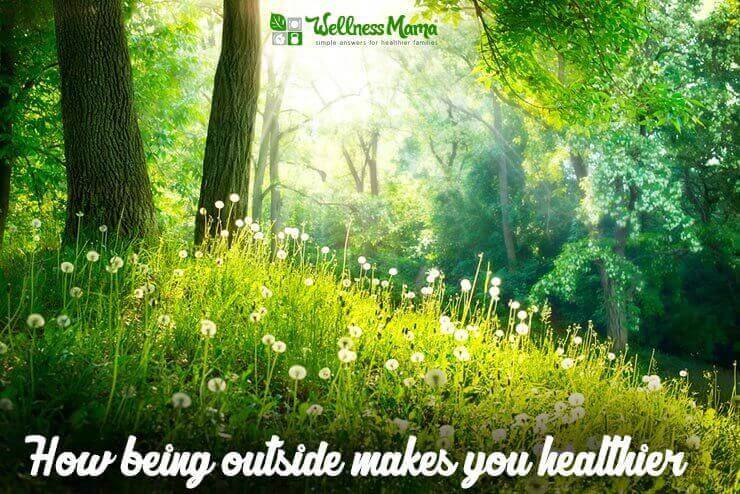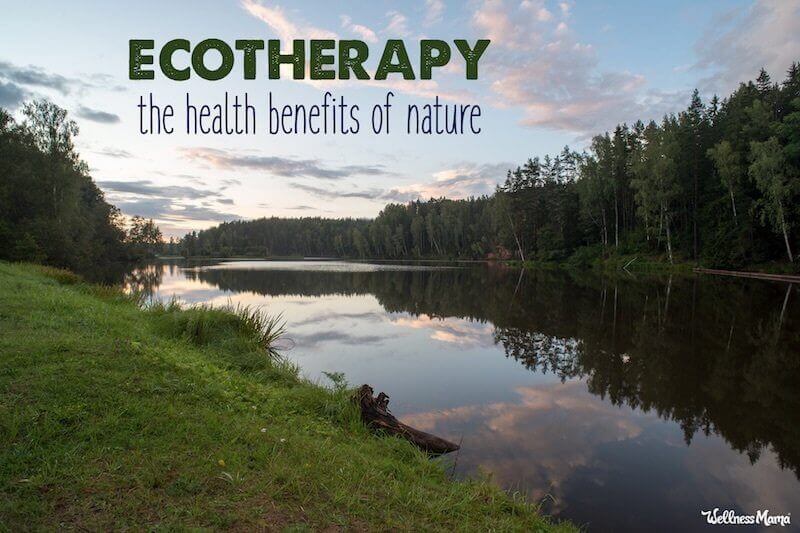We’ve all craved nature at some time or another. Maybe it was the white sands of a beach (and the accompanying health benefits) that we longed for or the calmness of a mountain camping trip.
Perhaps we look forward to a hike in the woods or a canoe trip on a river… whatever our preferences, we all desire nature at some point, and with good reason.
The Benefits of Ecotherapy
It seems intuitive that we like to spend time outdoors, but science has now identified some of the reasons we actually NEED time in a more natural setting. In fact, there is a term for this, Ecotherapy, that refers to the various physical and psychological benefits of being outside.
Mental Benefits
A 2009 study found that the closer someone lived to a green space or nature area, the healthier that person was likely to be. In fact, those who lived closest to a park, nature preserve or wooded area were less likely to suffer from anxiety or depression.
Heart & Stress Benefits
Another study found that those who spent time hiking or resting in a forest had measurably lower cortisol rates, heart rates, and blood pressure.
ADD & ADHD
The University of Illinois conducted research that showed that children with ADD/ADHD experienced a reduction of symptoms after spending time outdoors (this ties in with a less well-studied theory that these disorders are at least partially “nature deficit disorders:”
In their most recent study, conducted on a nationwide scale, psychologists Andrea Taylor and Frances Kuo have found that children with attention deficit hyperactive disorder, or ADHD, experienced a significant reduction in symptoms after they participated in activities in green settings. Whatever the activity—whether it was playing basketball or reading a book—the degree of relief from ADHD symptoms was tied to the greenness of the setting in which it took place, with relatively green settings like tree-lined streets, backyards and parks trumping the indoors or outdoor places that lacked greenery.(2)
Of course, just spending time in nature won’t be a silver bullet for children struggling with ADD/ADHD, but spending some (free!) family time outdoors is worth a try.
Sleep Improvements & Longevity
Other studies have found sleep improvements, better immune system function, and lower rates of stress related disorders in those who spent regular time in nature.
All of these factors may be reasons that regular gardeners live longer and that the practice of “forest bathing” (spending time in the forest) has become popular in Japan and is even prescribed and covered by medical plans in some cases. (3)
So why is nature so important?
There are several factors that may contribute to the health benefits (though the true benefit may remain an intangible that we can instinctively feel but not explain)…
How Time Outdoors Makes Us Healthier
Have you ever been cooped up indoors for an extended period of time and just felt the need to get outside? Turns out there are some health reasons for this craving, including:
Vitamin D
One reason time outdoors may contribute to health is the exposure to Vitamin D producing sunlight. This vital pre-hormone is responsible for many aspects of health throughout the body.
Vitamin D deficiency has been linked to various types of cancer and obesity, as well as mental disorders and other health problems.
Though supplemental Vitamin D is available, some people don’t absorb it effectively (like me) and actually need sun exposure to get adequate Vitamin D.
Either way…spending time outdoors in moderate sun is a great way to get natural Vitamin D.
Exercise
Unless your version of spending time in nature involves driving into the woods and just sitting there, most nature experiences also include some form of exercise.
From rock climbing, swimming, hiking, and canoeing, most forms of outdoor activity also include movement.
We all know the benefits of exercise, yet most of us still aren’t getting enough exercise regularly. Spending time outdoors provides a chance for fun movement along with the other benefits of nature.
Since we should all be moving each day anyway, get the double benefit and get your exercise outdoors!
Grounding
This benefit of nature is somewhat controversial in modern medicine, and my post about it has gotten a wide range of comments, from those who swear by the benefits of grounding to those who insist it is completely made up.
The basic theory is that since many of us don’t come into direct skin contact with the Earth very much, a positive charge can build up in the body. Direct skin contact with the Earth acts as a “ground” just like it does for electrical outlets, reducing this extra positive charge.
Proponents of earthing report that it helps reduce inflammation in the body and improve sleep quality.
Whatever your opinion of earthing/grounding, it is another positive side effect of being outdoors, especially barefoot or swimming in a natural body of water.
Can’t Get Outdoors?
There are ways to get the benefits of grounding indoors with earthing mats or sheets.
Fresh Air
Indoor air is often up to 70 times more contaminated than outdoor air. With more air-tight insulation, windows and doors, and the plethora of chemicals and plastics we bring into our homes, most people come in contact with up to 6,000 chemicals regularly.
Spending time outdoors is a break from indoor air pollution and outdoor air may have additional benefits as well.
Outdoor air is a good source of beneficial negative ions and places like the beach and near waterfalls are especially good sources. These negative ions are also present in sunlight and after a thunderstorm, when you can smell the “freshness” in the air. Indoor air, by contrast, is deficient in negative ions and is often dry and contaminated.
Negative ions are referred to as “nature’s antidepressants” and are found to have a relaxing and healing effect.
Stuck indoors? Try these tips to help improve indoor air quality or consider getting some air-improving houseplants.
Eye Health
This is an often surprising benefit of spending time outdoors, and an increasingly important one.
We are seeing an increase in vision problems, especially in children. One possible reason is the amount of time that many of us spend looking at a computer or TV screen on a daily basis.
While children used to spend most of their time outdoors looking at a wide variety of colors, levels of brightness and depths, they now spend up to seven hours a day staring at a TV, computer, or tablet screen with artificial light. The result is an increase in nearsightedness, even in kids who aren’t genetically predisposed to it.
In fact, a study done in 2007 found that children who spent at least 2 hours a day outside were four times less likely to be nearsighted. (4) For children, this has especially dire consequences. The researchers speculated that bright outdoor light helps children develop the correct distance between the retina and lens and leads to better eyesight later in life. Since indoor lighting does not provide the same benefit, children who spend a lot of time indoors are much more likely to have vision problems later in life.
Staring at a screen can also lead to eye fatigue, headaches, neck or back problems, and other problems in adults.
Healthy Circadian Rhythm
Spending time outdoors, especially in morning sunlight, may help reduce the risk of obesity. In fact, a study at Northwestern University found that the earlier a study participant got morning sunlight, the lower than participant’s BMI.
This correlation remained strong even after researchers adjusted for exercise levels, age, calorie intake, and other factors that affect BMI. The reason? Getting sunlight in the morning helps keep cortisol levels and circadian rhythms in the right ranges.
The reverse correlation was also true, as exposure to light at night was a factor in gaining weight (another reason to make sure you have a dark sleep environment), but as little as half an hour of sun exposure before noon was enough to have an effect on reducing body weight.
This effect is so pronounced, in fact, that my doctor recommended morning sunlight exposure as part of my protocol to help improve my cortisol levels and thyroid health.
Does indoor light work?
Bright morning light outdoors is typically thousands of “lux” a measure of illuminance that is essentially one lumen per square meter. Indoor light typically only measures a few hundred lux and doesn’t contain the broad spectrum of light needed to correctly support the body’s internal clock.
While things like 10,000 lux energy light lamps get closer to the level of outdoor brightness and are often used in the winter by those who suffer from Seasonal Affective Disorder, nothing beats the benefits of nature with true sunshine.
Ecotherapy: Best Way to Get the Benefits of Nature?
As you can tell, there are a lot of factors that may contribute to the benefits of nature, but we still may never understand completely why spending time outdoors has such profound psychological and physiological effects. We do know that time outdoors is important and that we aren’t getting enough.
There are things we can do to get partial benefits, but the best (and least expensive) option is just to get outside… in the morning… near trees.
My Solution?
I take a long morning walk on a greenway near our home where there are plenty of trees, wildflowers, and even a small waterfall. I sometimes take my children on these walks, or I encourage them to spend time outdoors in the morning as well.
Gardening is another great way to get time outdoors, and spending time watering plants in the morning is a great way to get morning sunlight.
Find a way to spend some time outdoors each day (walking in the woods if you can!) and take your family with you. Need some motivation? Cue photo…
Ahhh…

How do you get the benefits of nature?


Leave a Reply